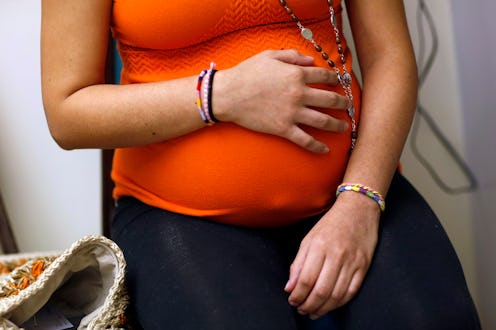News
How Women Would Suffer From A Ban On Abortion
In 1973, Roe v. Wade established that American women have the right to an abortion. In the 43 years since, there has been a concerted effort by conservatives to chip away at this right, and this year, the most extreme proposition from the GOP has come by way of Donald Trump. On Wednesday, he suggested that abortion should be made illegal, and that women should be punished for having the procedure. Here's how women would suffer from an abortion ban — even without He Who Should Not Be Named's added proposed legal penalties. It seems like a little history lesson is in order.
Before Roe v. Wade, access to abortion services were largely restricted by class and geography. Access to a safe abortion was even harder to find. Those who could afford abortions often traveled overseas, like to the UK, where abortion was mostly legal in 1967. Japan and Sweden were also popular destinations for abortion seekers. But those who couldn't travel had to find doctors who were willing to break the law, largely through word of mouth.
Women who lived in more conservative rural areas had an even harder time finding a safe way to have an abortion than women in urban areas. Younger and less-educated women weren't the only ones who resorted to improvisational measures like a hard fall down the stairs, knitting needles, or eating the plant Queen Anne's Lace.
Roe v. Wade was supposed to usher in an era of "safe, legal, and rare" abortions. This decision went against the cultural mores of many Americans, but it was a major political victory for women — young women in particular — in the fight for equality. While anti-abortion politicians drone on about the sanctity of life, there are women today, now, in this moment, who are dying because they can't access abortion. Women continue to die from improvised abortion methods done in unsanitary conditions without medical expertise. Women who, for whatever reason, believe that having a baby will absolutely ruin their life, and ruin the life of their child as well.
This may not be good dinner table conversation, but it must be an essential part of the public discourse. It's not like the vast majority of our leaders have proven that they actually can be trusted to deal with it, and maybe that is part of the problem. The Sexual Revolution of the 1960s, facilitated by the development of synthetic hormonal birth control, failed to make its way fully into the halls of government. Women are still a minority in Congress and state legislatures, even though women outnumber men in this country by about 4 percent.
Even without an explicit punishment for women who choose to have an abortion — a remarkably invasive, misogynistic, and draconian proposition from Trump — banning abortion would have horrific consequences for American women and families. I can't fathom losing a friend or loved one to sepsis after a botched procedure. This was the reality of life for women before Roe v. Wade. We absolutely do not need to go back to those days.
Images: Getty Images, Pixabay
